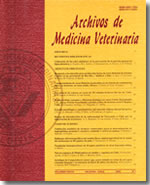The importance of the PI3K/AKT/mTOR signaling pathway in canine neoplasms: Literature review
Main Article Content
Abstract
ABSTRACT. The PI3K/AKT/mTOR pathway is related to proliferation, protein synthesis, survival, angiogenesis, apoptosis, and cell motility. Genetic alterations in either activation of oncogenes or inactivation of tumor suppressor make it the second most altered pathway in neoplastic processes. The PI3K/AKT/mTOR pathway is currently considered an attractive target for the development of anti-tumor molecules. Specific inhibitors of this pathway are under development, and those already recognized are being tested in clinical trials, representing a promising approach for the treatment of cancer patients. It is believed that, as this pathway is involved in the development of many human cancers, its activation may also be related to the development of various canine neoplasms. Therefore, this review aims to describe the state-of-the-art knowledge about the PI3K/AKT/mTOR pathway and highlight some research performed with either canine tumors or cellular lines.

